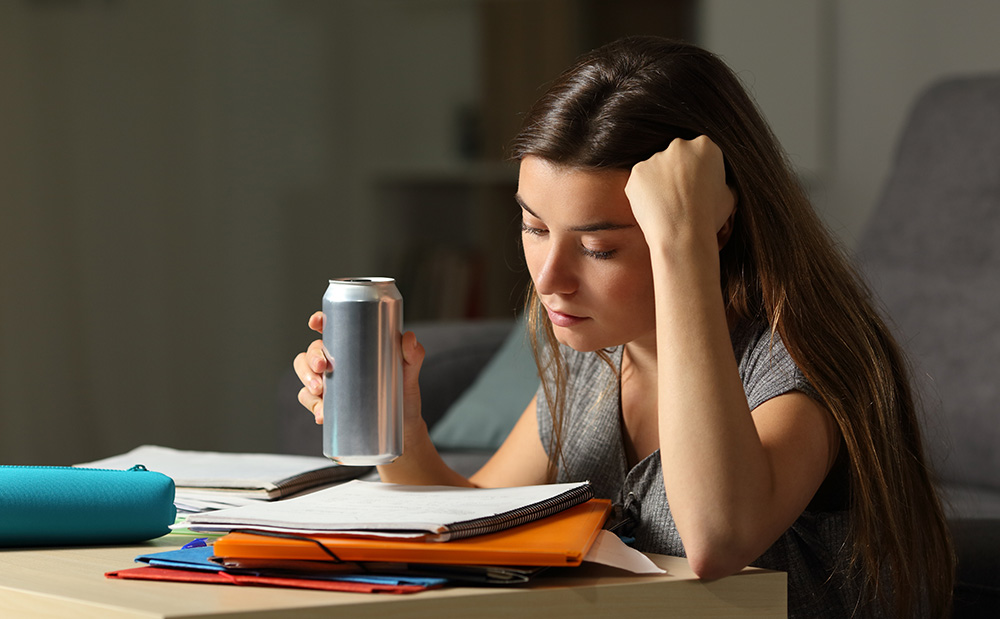
College students might be familiar with an all too common pattern of late nights, early classes, draining study sessions, and the stressful pressures of impending deadlines and exams. It’s no wonder that many tend to turn to energy drinks as a source of fuel to get through it all. While energy drinks, filled with caffeine and other compounds, claim to intensify focus and productivity, they can also interfere with sleep.
A recent study published in the journal BMJ Open has shown a relationship between energy drink consumption and sleep patterns among college and university students (1). The study also explored whether there were any differences in sleep characteristics between male and female students.
Getting enough quality sleep is vital for resetting and refreshing your brain and facilitating the organization and understanding of everything you’re taking in during study sessions and lectures — all pretty important stuff when working your way through college life.
The Controversy of Energy Drinks and Health
Energy drinks contain varying, sometimes controversial, amounts of caffeine sought after for their claims of boosting mental and physical performance, especially among students (2). Beverage brands such as Prime have been scrutinized for containing high levels of caffeine — 200 milligrams in a 12-ounce serving, which is equivalent to 6 cans of soda and double the amount in one can of Red Bull.
But it’s not just the excessive caffeine that’s a cause for concern. These drinks contain high levels of sugar and stimulants such as L-carnitine and guarana, according to Dr. Chelsie Rohrscheib, Ph.D., Head Sleep Expert and Neuroscientist at the sleep testing platform Wesper.
Studies have shown that energy drinks can cause elevated blood pressure and changes in heart rhythm and may trigger anxiety in children with anxiety disorders, among other undesirable side effects such as gastrointestinal distress and restlessness (3).
How Energy Drinks Impact Sleep Quality
Energy drinks can impact sleep quality by interfering with your neurochemistry, namely adenosine, a sleep molecule that binds to receptors in the brain to make you feel sleepy and initiate the sleep process. “Caffeine prevents the binding of adenosine, making us feel awake, alert, and energized. Even if we are sleepy, caffeine in the brain makes it difficult to fall asleep and stay asleep,” explains Rohrscheib.
Other stimulants in energy drinks, such as tyrosine and gurana, have a similar effect. Most energy drinks also contain a lot of sugar, which spikes blood glucose levels. Rohrscheib warns that when glucose levels crash, cells take up the sugar, leading to a sugar crash called hypoglycemia. Hypoglycemia triggers the brain to wake up so you can eat food to recover your blood sugar levels.
Caffeine also raises blood cortisol levels, a hormone responsible for stress. Like stimulants, cortisol is very wake-promoting and can lead to insomnia when levels are high, according to Rohrscheib.
Anyone sensitive to caffeine or prone to insomnia needs to be mindful of their energy drink consumption, especially in the hours leading up to bedtime, according to Lauri Leadley, Clinical Sleep Educator at Valley Sleep Center.
Moderation and awareness of individual tolerance levels are key to minimizing the potential adverse effects on sleep.
The caffeine in energy drinks can impact sleep due to increased arousal, leading to delayed sleep onset or insomnia. It can also lead to disruption of sleep architecture, impacting REM sleep and reducing the time your body needs to wind down and enter a restful sleep state, says Leadley.
The Snowball Effect of Using Energy Drinks
Caffeine and other stimulants in energy drinks promote wakefulness and have a long half-life, which means it can take up to 6-8 hours to stop affecting your brain, according to Rohrschieb. “College students tend to use energy drinks to stay awake to study or work, which results in poor sleep and an accumulation of sleep debt, leaving the student even more tired, which promotes additional consumption of energy drinks,” explains Rohrscheib.
Using an energy drink for quick energy now means you’ll have trouble falling asleep when you’re ready. According to Leadley, caffeine is also a diuretic that can contribute to dehydration, which can further impact your sleep.
Pulling that “all-nighter” to study or get that paper in on time while consuming caffeine and sugary snacks to do so disrupts your body’s internal clock, says Leadley. Doing this consistently — burning the candle at both ends, drinking caffeine and sugar to give you that second wind—will cause a hard crash and burn.
Ultimately, this habit causes a snowball effect where students can’t sleep properly because they consume energy drinks but need energy drinks to stay awake because they are sleep-deprived.
What Science Says About Energy Drinks and Sleep
There hasn’t been enough scientific data available about how energy drinks affect the sleep patterns of young adults, and the available studies have conflicting results. Experts have pushed for more research that uses comprehensive diagnostic guidelines rather than the basic measures seen in most studies.
Previously, the researchers of the recent BMJ study found during a study that young female students had higher rates of insomnia compared to their male counterparts, but there were no significant differences in sleep duration between the two genders.
In the new study, the researchers examined how often Norwegian students consumed energy drinks and how this affected their sleep, looking at whether there were differences between men and women.
Over 53,000 students in Norway aged 18 to 35 were surveyed, and information was gathered about the students’ gender, age, education level, and relationship status. They also asked about their energy drink consumption and sleep habits, including when they went to bed and woke up on weekdays and weekends.
The researchers calculated how long the students spent in bed and how efficient their sleep was and asked about any sleep problems, such as waking up early, having trouble falling asleep, or waking up during the night. Using these responses, they identified students with insomnia, following the Diagnostic and Statistical Manual of Mental Disorders guidelines.
Results showed that the students who drank energy drinks more often tended to sleep less and had less efficient sleep. They also had more sleep problems and were more likely to have insomnia. Both men and women were affected, but the impacts were more substantial in men.
Surprisingly, even students who only consumed the drinks once or twice a month had poorer sleep quality, leading the researchers to conclude that even small amounts can negatively affect sleep.
Risks of Chronic Sleep Loss
Chronic sleep loss and embracing a routine of dysfunctional bedtime patterns can raise the risks of cardiovascular disease, Alzheimer’s, dementia, high blood pressure, diabetes, obesity, cancer, and mental health issues, says Rohrscheib. “When we’re sleep-deprived, we’re more prone to infections since our immune system depends on sleep to maintain strength, and sleep-deprived individuals are also at higher risk for accidents or injury and poor academic performance,” she adds.
Sleep has many restorative benefits, so chronic sleep deprivation, which Leadlely defines as consistently getting less than 7-9 hours per night for adults, can impact your mental and physical health.
“If you continue to push through without getting enough rest, eventually stress, exhaustion, and sleep deprivation form a deadly cocktail,” warns Leadley. Combined, they can lead to mental health conditions like depression and anxiety. “Your work performance will also suffer, putting you at risk for burnout,” she adds.
Better Ways to Support Energy
Healthier alternatives to caffeine and questionable substance packed beverages are regular tea or coffee, which allows you to get some caffeine to help you stay energized without the extra additives and sugar. Rohrscheib also points out that regular black tea, green tea, and black coffee contain high levels of antioxidants, improving your health, immunity, and brain functioning rather than depleting them.
“Drinking plenty of water and eating a healthy diet can also help you stay alert and energized. Regular heart-raising exercises naturally spike your cortisol, which helps you maintain wakefulness,” adds Rohrscheib.
Remember, sleep is the only time your body’s cells regenerate. It’s when you rest your body and your mind. It’s a time to create memories and to dream. Leadley recommends allowing the cycle of wakefulness and sleepiness to occur organically — “It’s hard for college students because the days and nights can become full of work, play, and finding time to study and sleep — good habits are established when we’re young.”
Sources
1. aldenbach S, Hysing M, Strand TA, et alEnergy drink consumption and sleep parameters in college and university students: a national cross-sectional studyBMJ Open 2024;14:e072951. doi: 10.1136/bmjopen-2023-072951
2. Abramson, Ashley. “The Truth About What’s Really in Prime Energy Drinks,” Consumer Reports; https://www.consumerreports.org/health/hydration-beverages/the-truth-about-whats-really-in-prime-energy-drinks-a2960180425/; July 14, 2023.
3. Wassef B, Kohansieh M, Makaryus AN. “Effects of energy drinks on the cardiovascular system,” https://www.wjgnet.com/1949-8462/full/v9/i11/796.htm; World J Cardiol 2017; 9(11): 796-806
Rohrscheib, Chelsie. Author interview. February 2024.




























